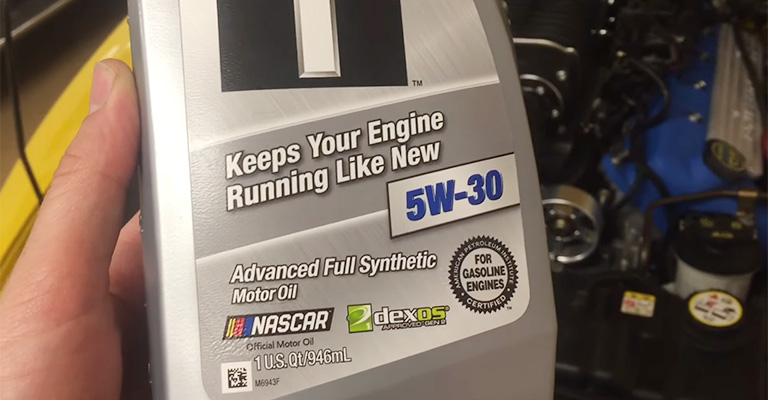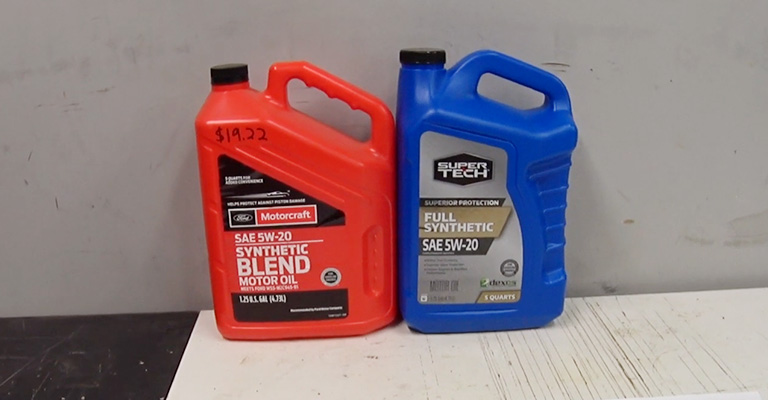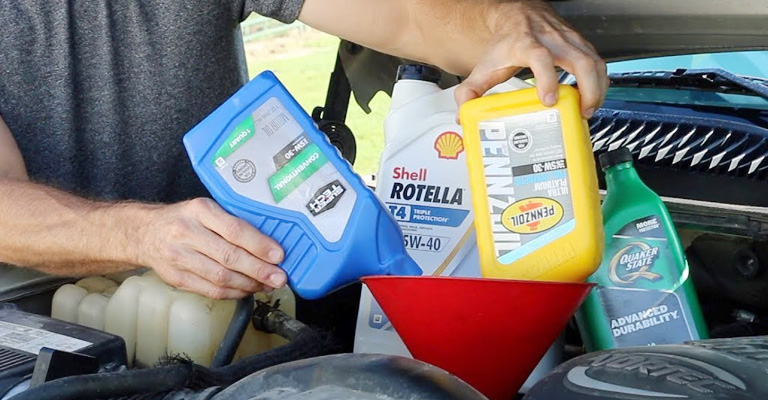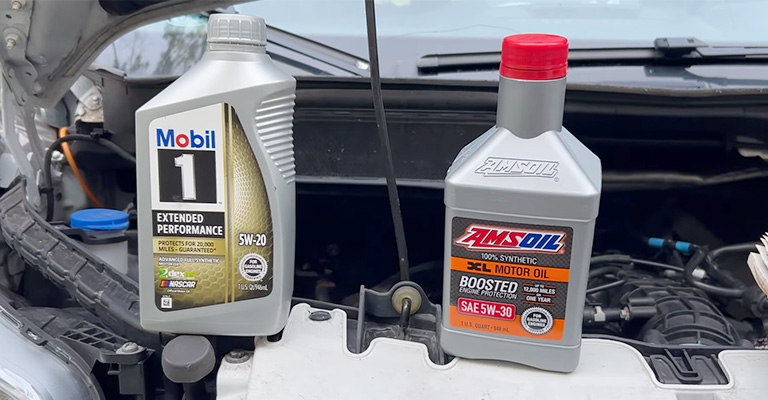Oil is a vital part of your car’s engine. It lubricates the moving parts and helps reduce friction to extend the engine’s life. There are many types of oil on the market, but 5w20 and 5w30 are two common types people often ask about.
Now, to the main topic. Can I use 5w30 instead of 5w20? The answer to this question is no. You cannot use 5w30 instead of 5w20. You should always use the type of oil that your car manufacturer recommends.
5w30 is a type of motor oil that is made for cold weather. It has a higher viscosity than 5w20 and typically has a higher number on the “W” scale. This means it will offer better protection for your engine in cold weather than 5w20.

Using 5w30 Instead Of 5w20 – Good or Bad?
There is no good reason to use 5w30 oil (or any other oil weight) instead of 5w20 oil since even the slightest difference in viscosity can cause engine damage.
Engines built with 5w20 oil were specifically designed to operate with it. When the engine reaches an operating temperature of 212°F, all the components that are in contact with the oil must have a certain viscosity.
As 5w20 oil reaches this temperature, it will have a lower viscosity than 5w30 oil, allowing it to flow more smoothly and with less resistance. If the engine runs on 5w30 instead of 5w20, it will encounter more resistance from the oil when it reaches operating temperature.
By using 5w30 oil instead of 5w20 when your owner’s manual does not recommend or approve it, you risk voiding your car’s powertrain warranty, reducing engine efficiency, and potentially damaging the engine.
What Happens If You Use 5w 30 Oil Instead Of 5w 20 Oil?

It is unlikely that sudden problems will arise if your engine supports the use of different oils. If it doesn’t, it will put your engine’s longevity at risk. Friction is increased when your engine is exposed to somewhat thicker oil than it is used to.
Due to the thicker oil’s resistance, your engine must work harder to complete its tasks. Oil leaks, engine deposits, and sludge buildup are all problems caused by the increased friction from thicker oil.
Can You Use 5w 30 Oil Instead Of 5w 20 Oil?
Using the recommended engine oil for your car ensures a longer service life for the engine components. If you refuse to change your oil, you could damage your automobile’s powertrain warranty, lower your engine’s performance, and, ultimately, damage your engine.
It’s worse when different oils are mixed. There will be no improvement in performance by doing this. However, it may cause the engine to wear out faster. In other words, even if you allow oils to mix in your engine, there won’t be much performance improvement.
It is best to use one viscosity rating at a time to prevent problems. It is also important to consider the driving conditions in which you will be driving your car when choosing an oil. 5w 30 is the best oil for drivers in warmer climates.
As a result, it has a higher viscosity index and can be used at warmer temperatures than 5w 20 oil. In cold and hot weather, 5w 30 oil is recommended. An oil with a viscosity of 5w 20 is appropriate for chilly climates. The engine is designed for light-duty applications that do not get hot. Furthermore, 5w 20 oil offers good cold-start performance.
Can You Mix 5W-20 And 5W-30 Oils?

Mixing two multigrade oils in some engines may be possible, but most mechanics do not recommend doing so. Sometimes, mixing different types of oil will nullify your warranty and cost you thousands of dollars in repairs.
Moreover, you’re putting your engine at risk and reducing its durability. You may encounter problems with the basic functioning of critical engine parts if you mix 5W-20 and 5W-30 (or any other grade of oil).
Mixing different viscosity grade oils won’t yield noticeable results, even if your engine allows it. You should stick to a single viscosity rating for your car engine, even if it’s capable of using a variety of viscosity grades.
What Is The Difference Between 5w 30 And 5w 20 Oils?
Viscosity determines the grade of motor oil. The most commonly used engine oils in colder temperatures are 5w 20 and 5w 30. Nonetheless, they should only be used for engines that are older or used for light-duty work. This is because an oil with a higher rating indicates that it is thicker and is better suited to engines that run hot.
Oils with multigrade are graded in the XW-XX format. Using this sequence, the first number (5) corresponds to the oil’s viscosity in winter. We’ve reached the end of winter, as you’ve probably guessed.
104°F (40°C) is the temperature at which your motor oil will have the highest viscosity. As the oil heats up to 212°F (100°C), the second set of numbers (20 and 30) indicate its viscosity.
It might be the same viscosity ratings for both 5w 20 and 5w 30, but their behavior at 104°F differs. As a result, 5w 30 becomes thicker than 5w 20 as the engine reaches its operating temperature.
Which Among The Two Is Better?

There isn’t a winner when it comes to behavior and benefits. Each has its own set of perks and drawbacks, however.
Your engine is less fuel efficient and produces less horsepower with 5w 30 oil. This is mainly because a thicker consistency implies an increase in resistance. It is more popular due to its versatility in different engines and its better protection in warmer climates.
Although 5w 20 oil has some disadvantages, it has some advantages. As a result of its thinner viscosity, less friction is created, meaning the parts of the engine receive smoother protection. Furthermore, it improves fuel efficiency at colder temperatures.
Are 5W-20 And 5W-30 Oil Synthetic?
In addition to conventional oils, synthetic oils are also available in 5W-20 and 5W-30. Base oil for conventional oils is refined crude oil mixed with various additives (such as corrosion inhibitors and viscosity index improvers).
Besides providing decent fuel economy, it also protects the engine from friction and damage. The lifespan of conventional oil is shorter than that of synthetic oil. In contrast, synthetic motor oil is highly stable and reliable even under extreme conditions.
It has even been shown that a synthetic oil rated 5W-20 may perform better in a warmer climate than a conventional oil rated 5W-30. Due to this, synthetic motor oils have a wider temperature range because they are made by breaking down and rebuilding hydrocarbon atoms.
Synthetic blends are also available in 5W-20 and 5W-30 oils. Multigrade synthetic blend oils perform better than regular oils and are more affordable than synthetic oils.
The oil that is specifically designed for high-mileage engines may be needed to protect older or high-mileage engines. High-mileage vehicles have racked up more than 75,000 miles in the automotive industry.
If you have a car that falls into this category, talk to your mechanic about the right oil (5W-20 or 5W-30).
Notes:
Especially if you are unfamiliar with the automobile world and its many parts, it is easy to mix up the two most commonly used engine oils. Ignoring the difference between the two oils could lead to serious problems for you and your engine.
Final Words
If a mix-up occurs, your engine might not be affected immediately. It is best to drain and change the oil immediately, considering the engine’s longevity. It may take longer to replace it with the recommended oil, so you can do the following instead.
- Start your car again after cooling the engine if the temperature reaches the red zone.
- Make sure the engine temperature is kept to a minimum.
- Slow down when you drive.
Remember to keep a close eye on the type of oil you use for your engine. Let your mechanic know if they accidentally refill the wrong oil and get an oil change.
If you don’t do this, you might encounter problems such as unusual engine noises, oil leaks, and engine deposits. There may be a burning smell from the engine, reduced fuel efficiency, and increased oil consumption.





Actually the 5.4 3v triton can use 5w30 instead of 5w20. Ford sent a bulletin out to Ford dealerships several years ago recommending that mechanics use the 5w30 instead of 5w20. I myself still use Motorcraft’s synthetic blend 5w20. I have 328k miles and still rolling strong.